Responsible Tourism: Evaluating Initiatives (University Essay)
VerifiedAdded on 2022/08/26
|9
|2773
|33
Essay
AI Summary
This essay delves into the realm of responsible tourism, evaluating its initiatives and impacts. It begins by defining key concepts such as ecotourism, wildlife sanctuaries, and biosphere reserves, setting the stage for a comprehensive analysis. The essay then explores the benefits and limitations of responsible tourism practices, supported by examples. It examines the effects of tourism on the environment, economy, and local communities. Furthermore, the essay offers recommendations for enhancing responsible tourism initiatives to achieve greater sustainability within the tourism sector. The discussion covers the value chain of the tourism industry, its interconnectedness with other sectors, and its impact on developing countries. The essay concludes with a synthesis of the arguments and provides insights into the future of responsible tourism. The essay utilizes a range of academic resources to support its claims.
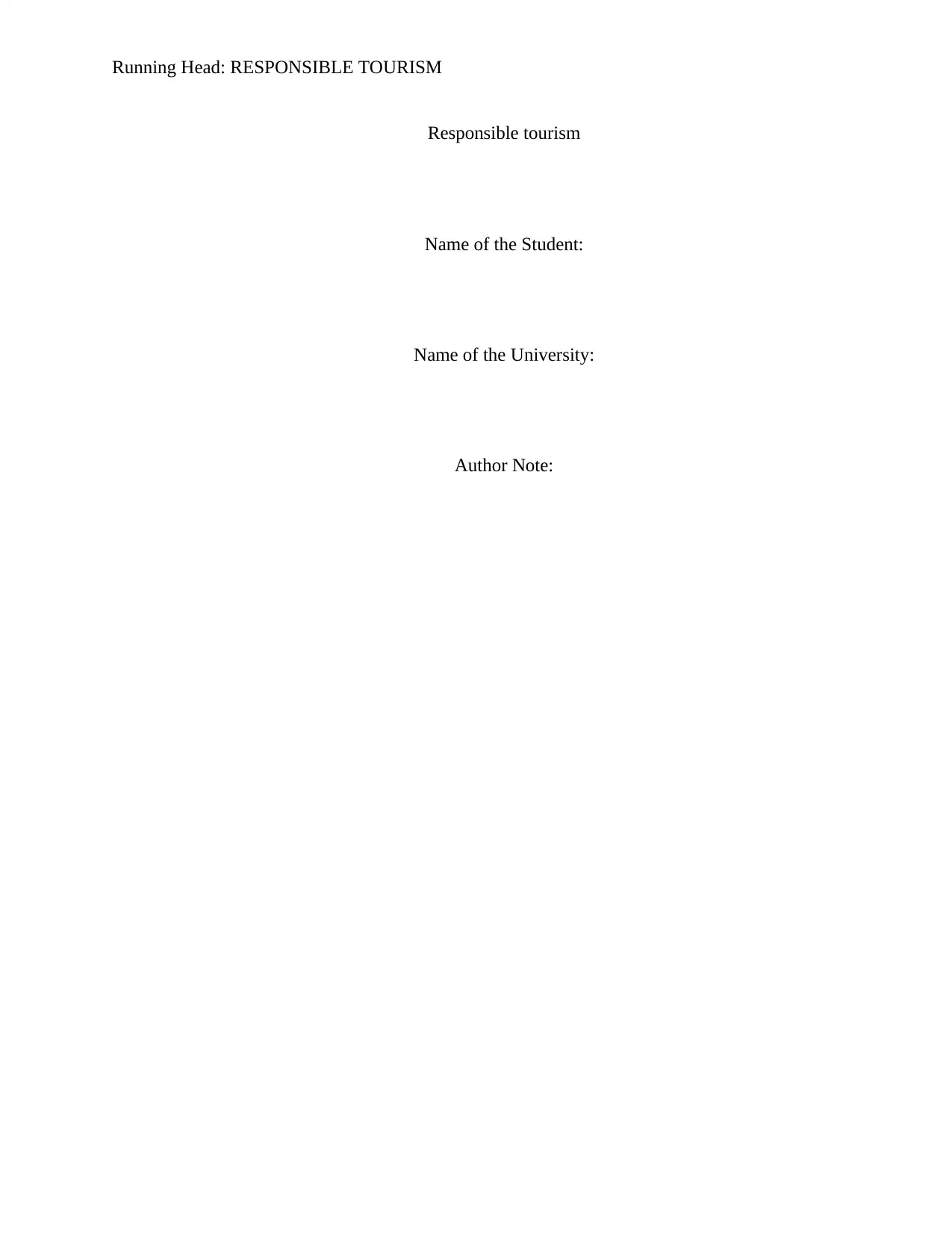
Running Head: RESPONSIBLE TOURISM
Responsible tourism
Name of the Student:
Name of the University:
Author Note:
Responsible tourism
Name of the Student:
Name of the University:
Author Note:
Paraphrase This Document
Need a fresh take? Get an instant paraphrase of this document with our AI Paraphraser
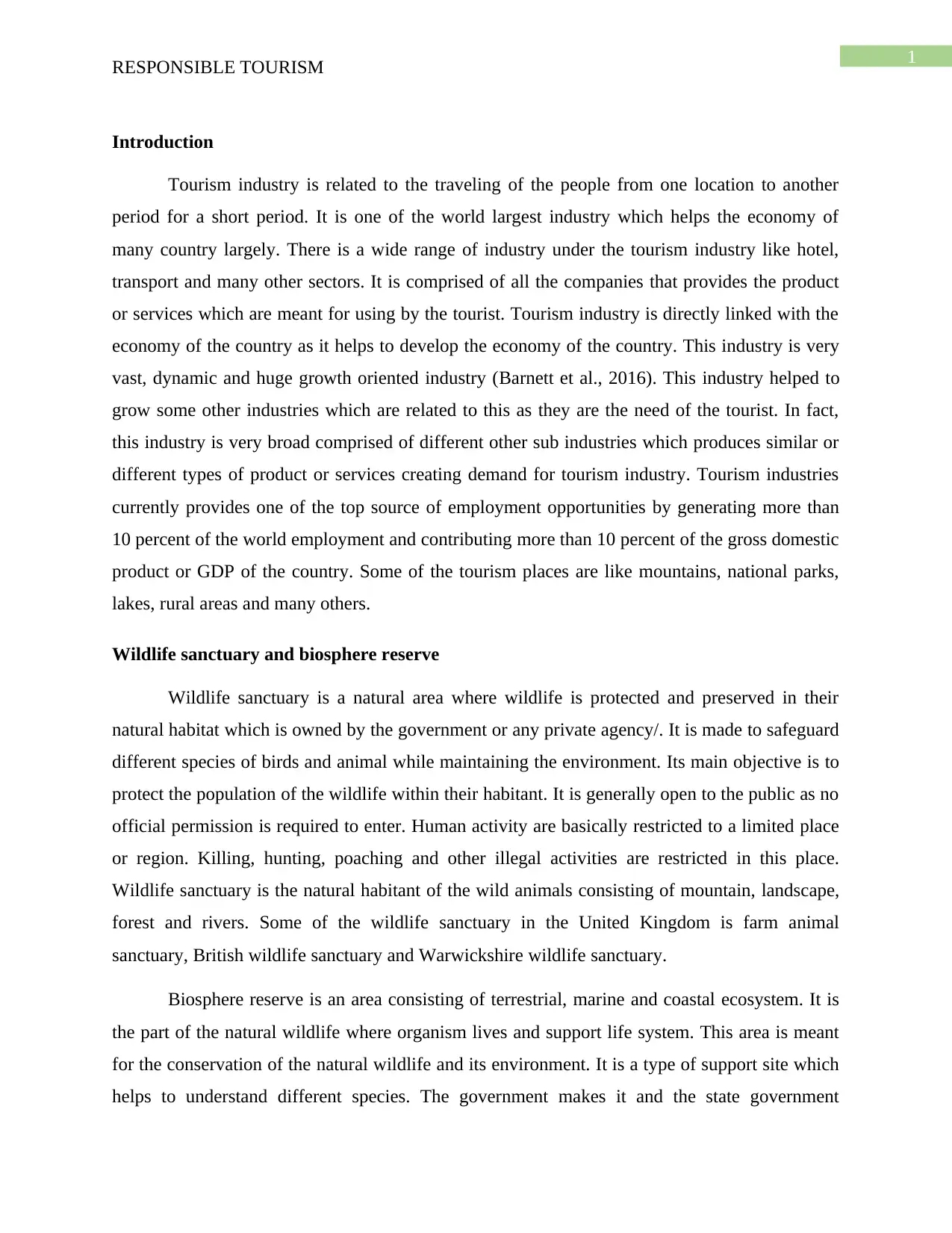
1
RESPONSIBLE TOURISM
Introduction
Tourism industry is related to the traveling of the people from one location to another
period for a short period. It is one of the world largest industry which helps the economy of
many country largely. There is a wide range of industry under the tourism industry like hotel,
transport and many other sectors. It is comprised of all the companies that provides the product
or services which are meant for using by the tourist. Tourism industry is directly linked with the
economy of the country as it helps to develop the economy of the country. This industry is very
vast, dynamic and huge growth oriented industry (Barnett et al., 2016). This industry helped to
grow some other industries which are related to this as they are the need of the tourist. In fact,
this industry is very broad comprised of different other sub industries which produces similar or
different types of product or services creating demand for tourism industry. Tourism industries
currently provides one of the top source of employment opportunities by generating more than
10 percent of the world employment and contributing more than 10 percent of the gross domestic
product or GDP of the country. Some of the tourism places are like mountains, national parks,
lakes, rural areas and many others.
Wildlife sanctuary and biosphere reserve
Wildlife sanctuary is a natural area where wildlife is protected and preserved in their
natural habitat which is owned by the government or any private agency/. It is made to safeguard
different species of birds and animal while maintaining the environment. Its main objective is to
protect the population of the wildlife within their habitant. It is generally open to the public as no
official permission is required to enter. Human activity are basically restricted to a limited place
or region. Killing, hunting, poaching and other illegal activities are restricted in this place.
Wildlife sanctuary is the natural habitant of the wild animals consisting of mountain, landscape,
forest and rivers. Some of the wildlife sanctuary in the United Kingdom is farm animal
sanctuary, British wildlife sanctuary and Warwickshire wildlife sanctuary.
Biosphere reserve is an area consisting of terrestrial, marine and coastal ecosystem. It is
the part of the natural wildlife where organism lives and support life system. This area is meant
for the conservation of the natural wildlife and its environment. It is a type of support site which
helps to understand different species. The government makes it and the state government
RESPONSIBLE TOURISM
Introduction
Tourism industry is related to the traveling of the people from one location to another
period for a short period. It is one of the world largest industry which helps the economy of
many country largely. There is a wide range of industry under the tourism industry like hotel,
transport and many other sectors. It is comprised of all the companies that provides the product
or services which are meant for using by the tourist. Tourism industry is directly linked with the
economy of the country as it helps to develop the economy of the country. This industry is very
vast, dynamic and huge growth oriented industry (Barnett et al., 2016). This industry helped to
grow some other industries which are related to this as they are the need of the tourist. In fact,
this industry is very broad comprised of different other sub industries which produces similar or
different types of product or services creating demand for tourism industry. Tourism industries
currently provides one of the top source of employment opportunities by generating more than
10 percent of the world employment and contributing more than 10 percent of the gross domestic
product or GDP of the country. Some of the tourism places are like mountains, national parks,
lakes, rural areas and many others.
Wildlife sanctuary and biosphere reserve
Wildlife sanctuary is a natural area where wildlife is protected and preserved in their
natural habitat which is owned by the government or any private agency/. It is made to safeguard
different species of birds and animal while maintaining the environment. Its main objective is to
protect the population of the wildlife within their habitant. It is generally open to the public as no
official permission is required to enter. Human activity are basically restricted to a limited place
or region. Killing, hunting, poaching and other illegal activities are restricted in this place.
Wildlife sanctuary is the natural habitant of the wild animals consisting of mountain, landscape,
forest and rivers. Some of the wildlife sanctuary in the United Kingdom is farm animal
sanctuary, British wildlife sanctuary and Warwickshire wildlife sanctuary.
Biosphere reserve is an area consisting of terrestrial, marine and coastal ecosystem. It is
the part of the natural wildlife where organism lives and support life system. This area is meant
for the conservation of the natural wildlife and its environment. It is a type of support site which
helps to understand different species. The government makes it and the state government
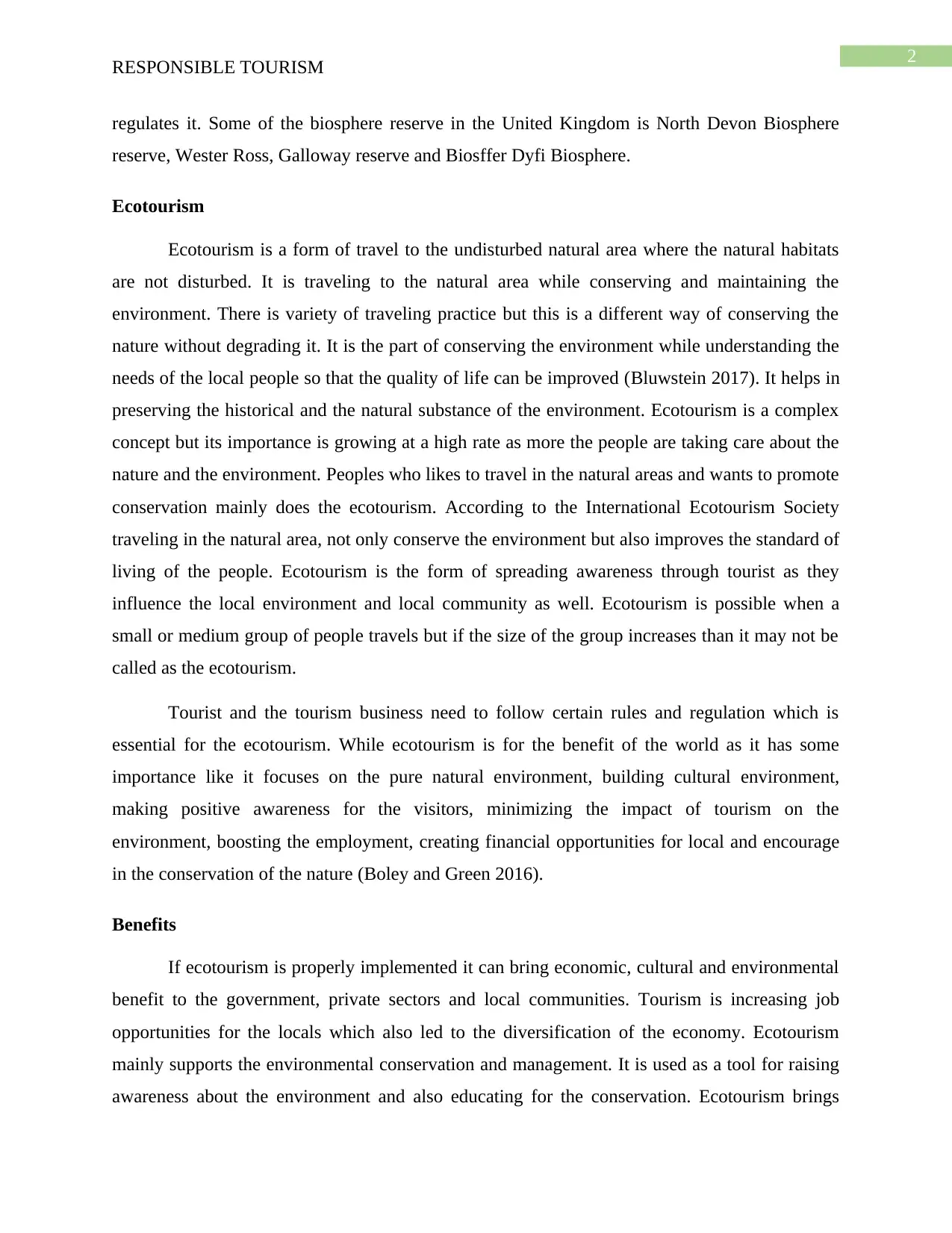
2
RESPONSIBLE TOURISM
regulates it. Some of the biosphere reserve in the United Kingdom is North Devon Biosphere
reserve, Wester Ross, Galloway reserve and Biosffer Dyfi Biosphere.
Ecotourism
Ecotourism is a form of travel to the undisturbed natural area where the natural habitats
are not disturbed. It is traveling to the natural area while conserving and maintaining the
environment. There is variety of traveling practice but this is a different way of conserving the
nature without degrading it. It is the part of conserving the environment while understanding the
needs of the local people so that the quality of life can be improved (Bluwstein 2017). It helps in
preserving the historical and the natural substance of the environment. Ecotourism is a complex
concept but its importance is growing at a high rate as more the people are taking care about the
nature and the environment. Peoples who likes to travel in the natural areas and wants to promote
conservation mainly does the ecotourism. According to the International Ecotourism Society
traveling in the natural area, not only conserve the environment but also improves the standard of
living of the people. Ecotourism is the form of spreading awareness through tourist as they
influence the local environment and local community as well. Ecotourism is possible when a
small or medium group of people travels but if the size of the group increases than it may not be
called as the ecotourism.
Tourist and the tourism business need to follow certain rules and regulation which is
essential for the ecotourism. While ecotourism is for the benefit of the world as it has some
importance like it focuses on the pure natural environment, building cultural environment,
making positive awareness for the visitors, minimizing the impact of tourism on the
environment, boosting the employment, creating financial opportunities for local and encourage
in the conservation of the nature (Boley and Green 2016).
Benefits
If ecotourism is properly implemented it can bring economic, cultural and environmental
benefit to the government, private sectors and local communities. Tourism is increasing job
opportunities for the locals which also led to the diversification of the economy. Ecotourism
mainly supports the environmental conservation and management. It is used as a tool for raising
awareness about the environment and also educating for the conservation. Ecotourism brings
RESPONSIBLE TOURISM
regulates it. Some of the biosphere reserve in the United Kingdom is North Devon Biosphere
reserve, Wester Ross, Galloway reserve and Biosffer Dyfi Biosphere.
Ecotourism
Ecotourism is a form of travel to the undisturbed natural area where the natural habitats
are not disturbed. It is traveling to the natural area while conserving and maintaining the
environment. There is variety of traveling practice but this is a different way of conserving the
nature without degrading it. It is the part of conserving the environment while understanding the
needs of the local people so that the quality of life can be improved (Bluwstein 2017). It helps in
preserving the historical and the natural substance of the environment. Ecotourism is a complex
concept but its importance is growing at a high rate as more the people are taking care about the
nature and the environment. Peoples who likes to travel in the natural areas and wants to promote
conservation mainly does the ecotourism. According to the International Ecotourism Society
traveling in the natural area, not only conserve the environment but also improves the standard of
living of the people. Ecotourism is the form of spreading awareness through tourist as they
influence the local environment and local community as well. Ecotourism is possible when a
small or medium group of people travels but if the size of the group increases than it may not be
called as the ecotourism.
Tourist and the tourism business need to follow certain rules and regulation which is
essential for the ecotourism. While ecotourism is for the benefit of the world as it has some
importance like it focuses on the pure natural environment, building cultural environment,
making positive awareness for the visitors, minimizing the impact of tourism on the
environment, boosting the employment, creating financial opportunities for local and encourage
in the conservation of the nature (Boley and Green 2016).
Benefits
If ecotourism is properly implemented it can bring economic, cultural and environmental
benefit to the government, private sectors and local communities. Tourism is increasing job
opportunities for the locals which also led to the diversification of the economy. Ecotourism
mainly supports the environmental conservation and management. It is used as a tool for raising
awareness about the environment and also educating for the conservation. Ecotourism brings
⊘ This is a preview!⊘
Do you want full access?
Subscribe today to unlock all pages.

Trusted by 1+ million students worldwide
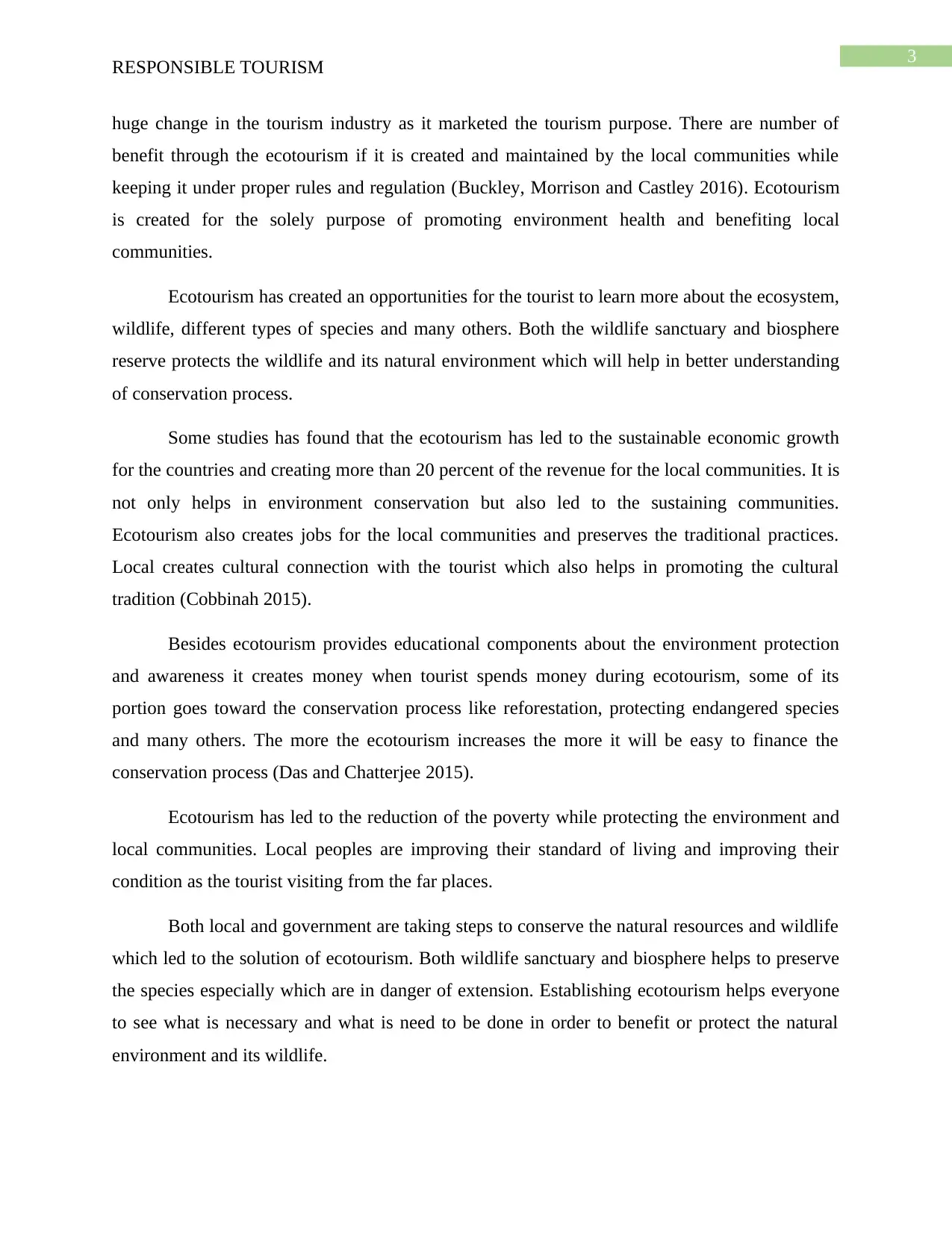
3
RESPONSIBLE TOURISM
huge change in the tourism industry as it marketed the tourism purpose. There are number of
benefit through the ecotourism if it is created and maintained by the local communities while
keeping it under proper rules and regulation (Buckley, Morrison and Castley 2016). Ecotourism
is created for the solely purpose of promoting environment health and benefiting local
communities.
Ecotourism has created an opportunities for the tourist to learn more about the ecosystem,
wildlife, different types of species and many others. Both the wildlife sanctuary and biosphere
reserve protects the wildlife and its natural environment which will help in better understanding
of conservation process.
Some studies has found that the ecotourism has led to the sustainable economic growth
for the countries and creating more than 20 percent of the revenue for the local communities. It is
not only helps in environment conservation but also led to the sustaining communities.
Ecotourism also creates jobs for the local communities and preserves the traditional practices.
Local creates cultural connection with the tourist which also helps in promoting the cultural
tradition (Cobbinah 2015).
Besides ecotourism provides educational components about the environment protection
and awareness it creates money when tourist spends money during ecotourism, some of its
portion goes toward the conservation process like reforestation, protecting endangered species
and many others. The more the ecotourism increases the more it will be easy to finance the
conservation process (Das and Chatterjee 2015).
Ecotourism has led to the reduction of the poverty while protecting the environment and
local communities. Local peoples are improving their standard of living and improving their
condition as the tourist visiting from the far places.
Both local and government are taking steps to conserve the natural resources and wildlife
which led to the solution of ecotourism. Both wildlife sanctuary and biosphere helps to preserve
the species especially which are in danger of extension. Establishing ecotourism helps everyone
to see what is necessary and what is need to be done in order to benefit or protect the natural
environment and its wildlife.
RESPONSIBLE TOURISM
huge change in the tourism industry as it marketed the tourism purpose. There are number of
benefit through the ecotourism if it is created and maintained by the local communities while
keeping it under proper rules and regulation (Buckley, Morrison and Castley 2016). Ecotourism
is created for the solely purpose of promoting environment health and benefiting local
communities.
Ecotourism has created an opportunities for the tourist to learn more about the ecosystem,
wildlife, different types of species and many others. Both the wildlife sanctuary and biosphere
reserve protects the wildlife and its natural environment which will help in better understanding
of conservation process.
Some studies has found that the ecotourism has led to the sustainable economic growth
for the countries and creating more than 20 percent of the revenue for the local communities. It is
not only helps in environment conservation but also led to the sustaining communities.
Ecotourism also creates jobs for the local communities and preserves the traditional practices.
Local creates cultural connection with the tourist which also helps in promoting the cultural
tradition (Cobbinah 2015).
Besides ecotourism provides educational components about the environment protection
and awareness it creates money when tourist spends money during ecotourism, some of its
portion goes toward the conservation process like reforestation, protecting endangered species
and many others. The more the ecotourism increases the more it will be easy to finance the
conservation process (Das and Chatterjee 2015).
Ecotourism has led to the reduction of the poverty while protecting the environment and
local communities. Local peoples are improving their standard of living and improving their
condition as the tourist visiting from the far places.
Both local and government are taking steps to conserve the natural resources and wildlife
which led to the solution of ecotourism. Both wildlife sanctuary and biosphere helps to preserve
the species especially which are in danger of extension. Establishing ecotourism helps everyone
to see what is necessary and what is need to be done in order to benefit or protect the natural
environment and its wildlife.
Paraphrase This Document
Need a fresh take? Get an instant paraphrase of this document with our AI Paraphraser
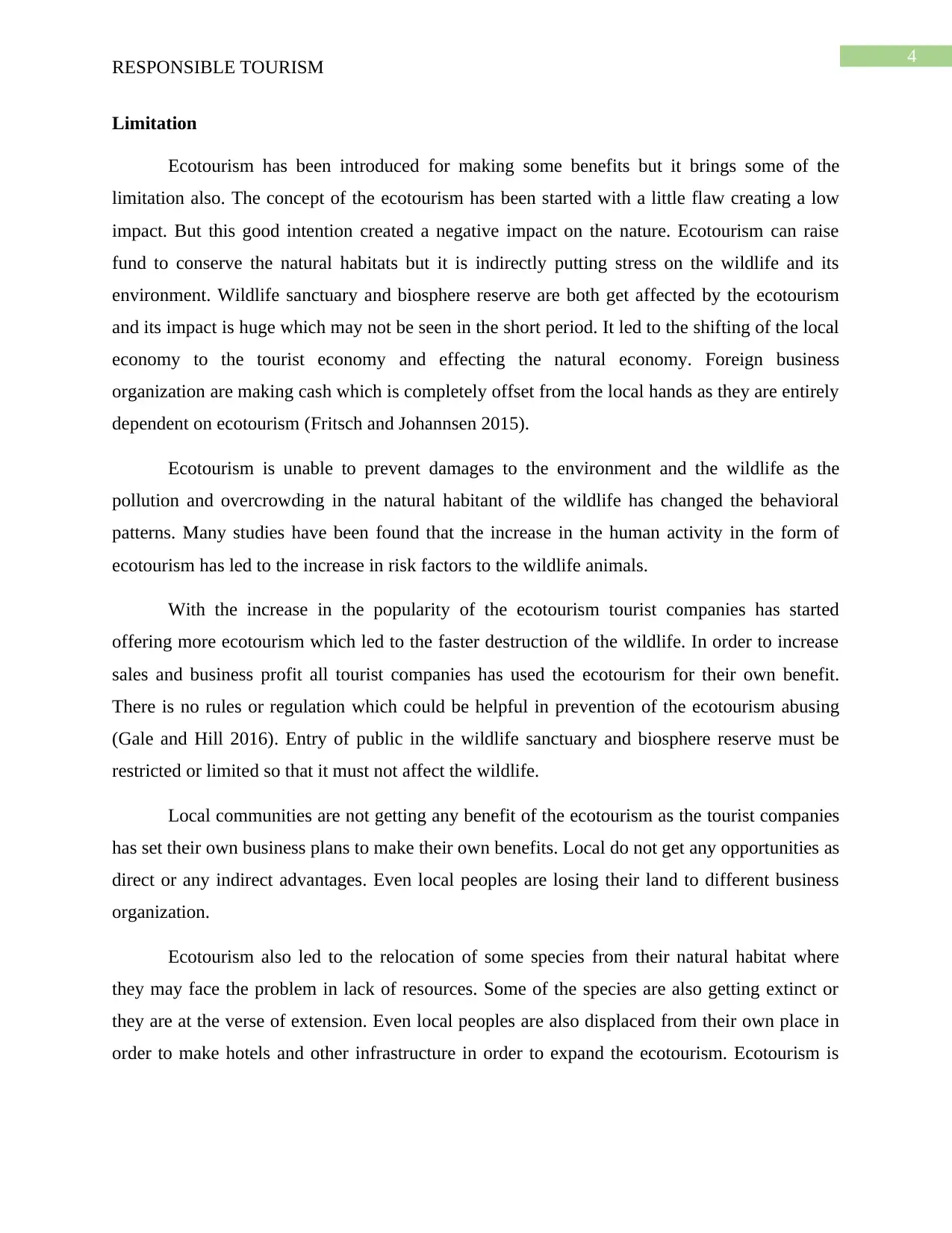
4
RESPONSIBLE TOURISM
Limitation
Ecotourism has been introduced for making some benefits but it brings some of the
limitation also. The concept of the ecotourism has been started with a little flaw creating a low
impact. But this good intention created a negative impact on the nature. Ecotourism can raise
fund to conserve the natural habitats but it is indirectly putting stress on the wildlife and its
environment. Wildlife sanctuary and biosphere reserve are both get affected by the ecotourism
and its impact is huge which may not be seen in the short period. It led to the shifting of the local
economy to the tourist economy and effecting the natural economy. Foreign business
organization are making cash which is completely offset from the local hands as they are entirely
dependent on ecotourism (Fritsch and Johannsen 2015).
Ecotourism is unable to prevent damages to the environment and the wildlife as the
pollution and overcrowding in the natural habitant of the wildlife has changed the behavioral
patterns. Many studies have been found that the increase in the human activity in the form of
ecotourism has led to the increase in risk factors to the wildlife animals.
With the increase in the popularity of the ecotourism tourist companies has started
offering more ecotourism which led to the faster destruction of the wildlife. In order to increase
sales and business profit all tourist companies has used the ecotourism for their own benefit.
There is no rules or regulation which could be helpful in prevention of the ecotourism abusing
(Gale and Hill 2016). Entry of public in the wildlife sanctuary and biosphere reserve must be
restricted or limited so that it must not affect the wildlife.
Local communities are not getting any benefit of the ecotourism as the tourist companies
has set their own business plans to make their own benefits. Local do not get any opportunities as
direct or any indirect advantages. Even local peoples are losing their land to different business
organization.
Ecotourism also led to the relocation of some species from their natural habitat where
they may face the problem in lack of resources. Some of the species are also getting extinct or
they are at the verse of extension. Even local peoples are also displaced from their own place in
order to make hotels and other infrastructure in order to expand the ecotourism. Ecotourism is
RESPONSIBLE TOURISM
Limitation
Ecotourism has been introduced for making some benefits but it brings some of the
limitation also. The concept of the ecotourism has been started with a little flaw creating a low
impact. But this good intention created a negative impact on the nature. Ecotourism can raise
fund to conserve the natural habitats but it is indirectly putting stress on the wildlife and its
environment. Wildlife sanctuary and biosphere reserve are both get affected by the ecotourism
and its impact is huge which may not be seen in the short period. It led to the shifting of the local
economy to the tourist economy and effecting the natural economy. Foreign business
organization are making cash which is completely offset from the local hands as they are entirely
dependent on ecotourism (Fritsch and Johannsen 2015).
Ecotourism is unable to prevent damages to the environment and the wildlife as the
pollution and overcrowding in the natural habitant of the wildlife has changed the behavioral
patterns. Many studies have been found that the increase in the human activity in the form of
ecotourism has led to the increase in risk factors to the wildlife animals.
With the increase in the popularity of the ecotourism tourist companies has started
offering more ecotourism which led to the faster destruction of the wildlife. In order to increase
sales and business profit all tourist companies has used the ecotourism for their own benefit.
There is no rules or regulation which could be helpful in prevention of the ecotourism abusing
(Gale and Hill 2016). Entry of public in the wildlife sanctuary and biosphere reserve must be
restricted or limited so that it must not affect the wildlife.
Local communities are not getting any benefit of the ecotourism as the tourist companies
has set their own business plans to make their own benefits. Local do not get any opportunities as
direct or any indirect advantages. Even local peoples are losing their land to different business
organization.
Ecotourism also led to the relocation of some species from their natural habitat where
they may face the problem in lack of resources. Some of the species are also getting extinct or
they are at the verse of extension. Even local peoples are also displaced from their own place in
order to make hotels and other infrastructure in order to expand the ecotourism. Ecotourism is
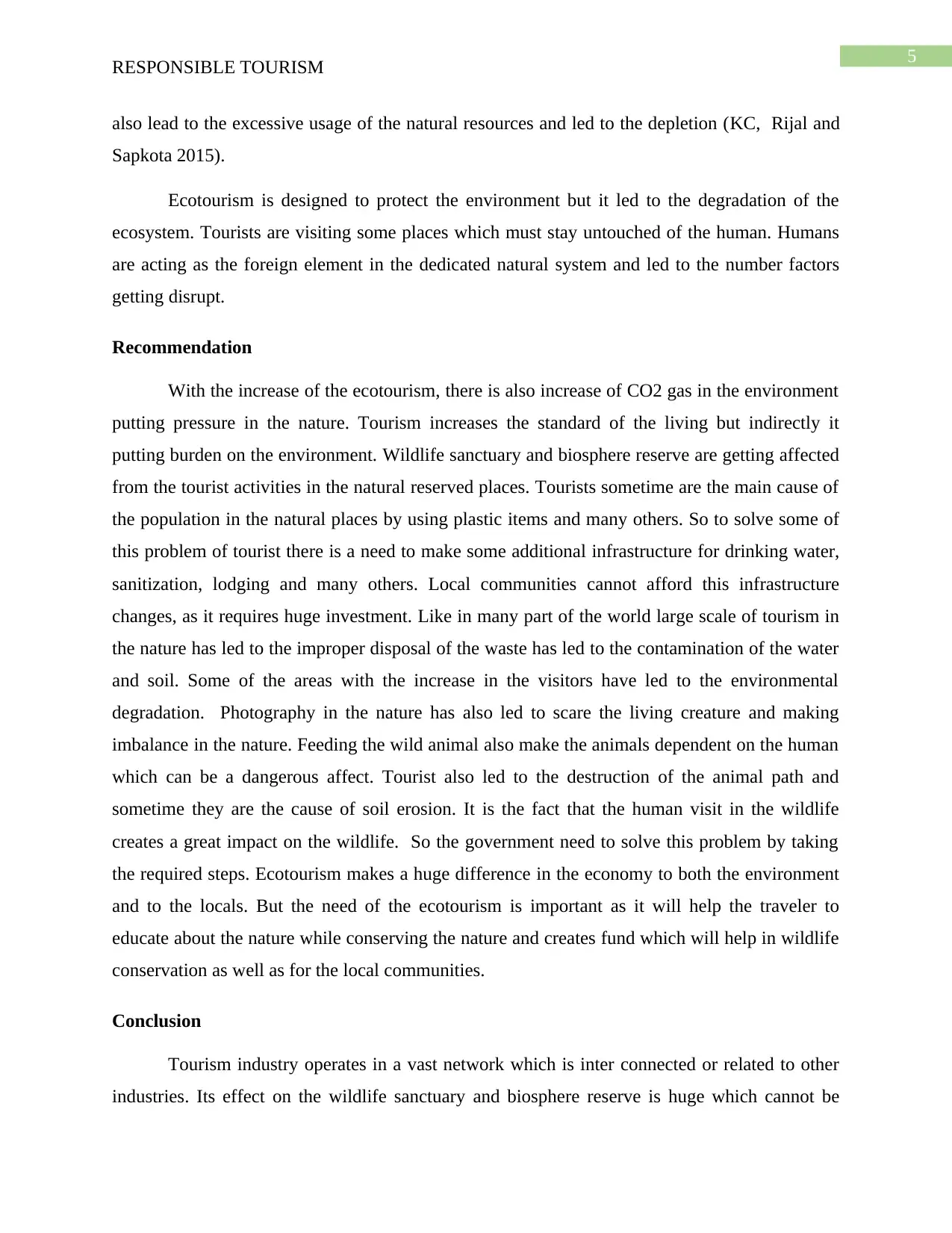
5
RESPONSIBLE TOURISM
also lead to the excessive usage of the natural resources and led to the depletion (KC, Rijal and
Sapkota 2015).
Ecotourism is designed to protect the environment but it led to the degradation of the
ecosystem. Tourists are visiting some places which must stay untouched of the human. Humans
are acting as the foreign element in the dedicated natural system and led to the number factors
getting disrupt.
Recommendation
With the increase of the ecotourism, there is also increase of CO2 gas in the environment
putting pressure in the nature. Tourism increases the standard of the living but indirectly it
putting burden on the environment. Wildlife sanctuary and biosphere reserve are getting affected
from the tourist activities in the natural reserved places. Tourists sometime are the main cause of
the population in the natural places by using plastic items and many others. So to solve some of
this problem of tourist there is a need to make some additional infrastructure for drinking water,
sanitization, lodging and many others. Local communities cannot afford this infrastructure
changes, as it requires huge investment. Like in many part of the world large scale of tourism in
the nature has led to the improper disposal of the waste has led to the contamination of the water
and soil. Some of the areas with the increase in the visitors have led to the environmental
degradation. Photography in the nature has also led to scare the living creature and making
imbalance in the nature. Feeding the wild animal also make the animals dependent on the human
which can be a dangerous affect. Tourist also led to the destruction of the animal path and
sometime they are the cause of soil erosion. It is the fact that the human visit in the wildlife
creates a great impact on the wildlife. So the government need to solve this problem by taking
the required steps. Ecotourism makes a huge difference in the economy to both the environment
and to the locals. But the need of the ecotourism is important as it will help the traveler to
educate about the nature while conserving the nature and creates fund which will help in wildlife
conservation as well as for the local communities.
Conclusion
Tourism industry operates in a vast network which is inter connected or related to other
industries. Its effect on the wildlife sanctuary and biosphere reserve is huge which cannot be
RESPONSIBLE TOURISM
also lead to the excessive usage of the natural resources and led to the depletion (KC, Rijal and
Sapkota 2015).
Ecotourism is designed to protect the environment but it led to the degradation of the
ecosystem. Tourists are visiting some places which must stay untouched of the human. Humans
are acting as the foreign element in the dedicated natural system and led to the number factors
getting disrupt.
Recommendation
With the increase of the ecotourism, there is also increase of CO2 gas in the environment
putting pressure in the nature. Tourism increases the standard of the living but indirectly it
putting burden on the environment. Wildlife sanctuary and biosphere reserve are getting affected
from the tourist activities in the natural reserved places. Tourists sometime are the main cause of
the population in the natural places by using plastic items and many others. So to solve some of
this problem of tourist there is a need to make some additional infrastructure for drinking water,
sanitization, lodging and many others. Local communities cannot afford this infrastructure
changes, as it requires huge investment. Like in many part of the world large scale of tourism in
the nature has led to the improper disposal of the waste has led to the contamination of the water
and soil. Some of the areas with the increase in the visitors have led to the environmental
degradation. Photography in the nature has also led to scare the living creature and making
imbalance in the nature. Feeding the wild animal also make the animals dependent on the human
which can be a dangerous affect. Tourist also led to the destruction of the animal path and
sometime they are the cause of soil erosion. It is the fact that the human visit in the wildlife
creates a great impact on the wildlife. So the government need to solve this problem by taking
the required steps. Ecotourism makes a huge difference in the economy to both the environment
and to the locals. But the need of the ecotourism is important as it will help the traveler to
educate about the nature while conserving the nature and creates fund which will help in wildlife
conservation as well as for the local communities.
Conclusion
Tourism industry operates in a vast network which is inter connected or related to other
industries. Its effect on the wildlife sanctuary and biosphere reserve is huge which cannot be
⊘ This is a preview!⊘
Do you want full access?
Subscribe today to unlock all pages.

Trusted by 1+ million students worldwide
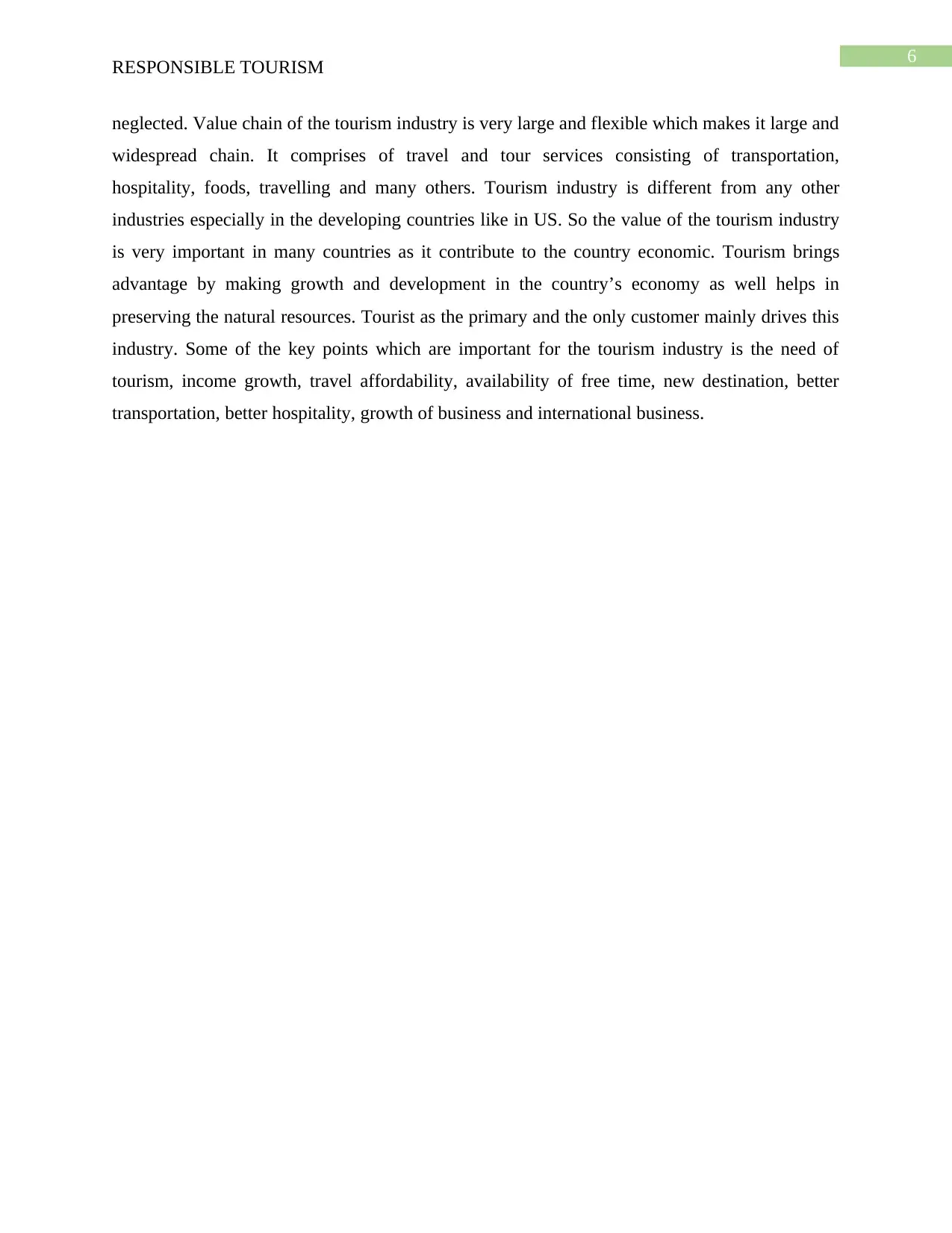
6
RESPONSIBLE TOURISM
neglected. Value chain of the tourism industry is very large and flexible which makes it large and
widespread chain. It comprises of travel and tour services consisting of transportation,
hospitality, foods, travelling and many others. Tourism industry is different from any other
industries especially in the developing countries like in US. So the value of the tourism industry
is very important in many countries as it contribute to the country economic. Tourism brings
advantage by making growth and development in the country’s economy as well helps in
preserving the natural resources. Tourist as the primary and the only customer mainly drives this
industry. Some of the key points which are important for the tourism industry is the need of
tourism, income growth, travel affordability, availability of free time, new destination, better
transportation, better hospitality, growth of business and international business.
RESPONSIBLE TOURISM
neglected. Value chain of the tourism industry is very large and flexible which makes it large and
widespread chain. It comprises of travel and tour services consisting of transportation,
hospitality, foods, travelling and many others. Tourism industry is different from any other
industries especially in the developing countries like in US. So the value of the tourism industry
is very important in many countries as it contribute to the country economic. Tourism brings
advantage by making growth and development in the country’s economy as well helps in
preserving the natural resources. Tourist as the primary and the only customer mainly drives this
industry. Some of the key points which are important for the tourism industry is the need of
tourism, income growth, travel affordability, availability of free time, new destination, better
transportation, better hospitality, growth of business and international business.
Paraphrase This Document
Need a fresh take? Get an instant paraphrase of this document with our AI Paraphraser
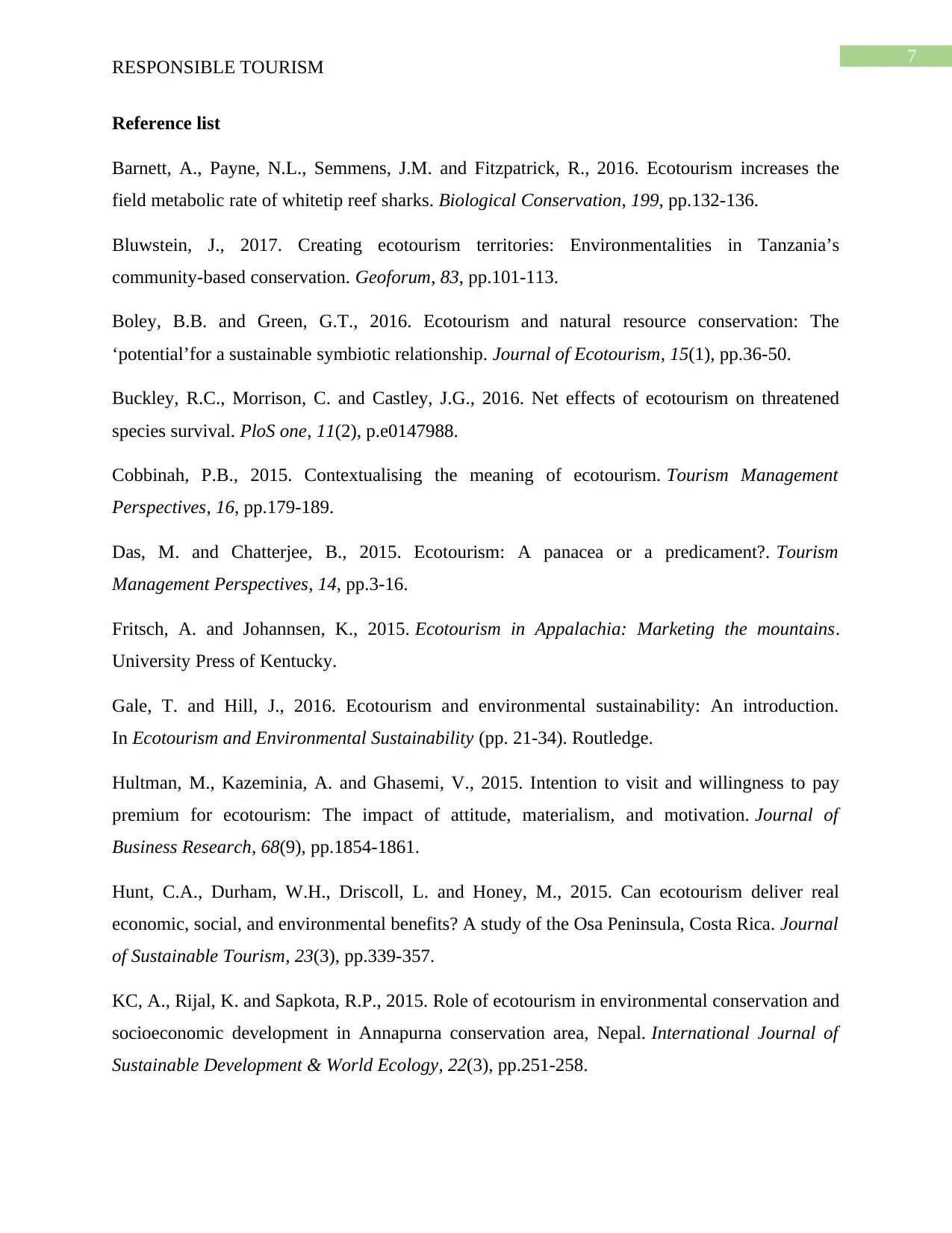
7
RESPONSIBLE TOURISM
Reference list
Barnett, A., Payne, N.L., Semmens, J.M. and Fitzpatrick, R., 2016. Ecotourism increases the
field metabolic rate of whitetip reef sharks. Biological Conservation, 199, pp.132-136.
Bluwstein, J., 2017. Creating ecotourism territories: Environmentalities in Tanzania’s
community-based conservation. Geoforum, 83, pp.101-113.
Boley, B.B. and Green, G.T., 2016. Ecotourism and natural resource conservation: The
‘potential’for a sustainable symbiotic relationship. Journal of Ecotourism, 15(1), pp.36-50.
Buckley, R.C., Morrison, C. and Castley, J.G., 2016. Net effects of ecotourism on threatened
species survival. PloS one, 11(2), p.e0147988.
Cobbinah, P.B., 2015. Contextualising the meaning of ecotourism. Tourism Management
Perspectives, 16, pp.179-189.
Das, M. and Chatterjee, B., 2015. Ecotourism: A panacea or a predicament?. Tourism
Management Perspectives, 14, pp.3-16.
Fritsch, A. and Johannsen, K., 2015. Ecotourism in Appalachia: Marketing the mountains.
University Press of Kentucky.
Gale, T. and Hill, J., 2016. Ecotourism and environmental sustainability: An introduction.
In Ecotourism and Environmental Sustainability (pp. 21-34). Routledge.
Hultman, M., Kazeminia, A. and Ghasemi, V., 2015. Intention to visit and willingness to pay
premium for ecotourism: The impact of attitude, materialism, and motivation. Journal of
Business Research, 68(9), pp.1854-1861.
Hunt, C.A., Durham, W.H., Driscoll, L. and Honey, M., 2015. Can ecotourism deliver real
economic, social, and environmental benefits? A study of the Osa Peninsula, Costa Rica. Journal
of Sustainable Tourism, 23(3), pp.339-357.
KC, A., Rijal, K. and Sapkota, R.P., 2015. Role of ecotourism in environmental conservation and
socioeconomic development in Annapurna conservation area, Nepal. International Journal of
Sustainable Development & World Ecology, 22(3), pp.251-258.
RESPONSIBLE TOURISM
Reference list
Barnett, A., Payne, N.L., Semmens, J.M. and Fitzpatrick, R., 2016. Ecotourism increases the
field metabolic rate of whitetip reef sharks. Biological Conservation, 199, pp.132-136.
Bluwstein, J., 2017. Creating ecotourism territories: Environmentalities in Tanzania’s
community-based conservation. Geoforum, 83, pp.101-113.
Boley, B.B. and Green, G.T., 2016. Ecotourism and natural resource conservation: The
‘potential’for a sustainable symbiotic relationship. Journal of Ecotourism, 15(1), pp.36-50.
Buckley, R.C., Morrison, C. and Castley, J.G., 2016. Net effects of ecotourism on threatened
species survival. PloS one, 11(2), p.e0147988.
Cobbinah, P.B., 2015. Contextualising the meaning of ecotourism. Tourism Management
Perspectives, 16, pp.179-189.
Das, M. and Chatterjee, B., 2015. Ecotourism: A panacea or a predicament?. Tourism
Management Perspectives, 14, pp.3-16.
Fritsch, A. and Johannsen, K., 2015. Ecotourism in Appalachia: Marketing the mountains.
University Press of Kentucky.
Gale, T. and Hill, J., 2016. Ecotourism and environmental sustainability: An introduction.
In Ecotourism and Environmental Sustainability (pp. 21-34). Routledge.
Hultman, M., Kazeminia, A. and Ghasemi, V., 2015. Intention to visit and willingness to pay
premium for ecotourism: The impact of attitude, materialism, and motivation. Journal of
Business Research, 68(9), pp.1854-1861.
Hunt, C.A., Durham, W.H., Driscoll, L. and Honey, M., 2015. Can ecotourism deliver real
economic, social, and environmental benefits? A study of the Osa Peninsula, Costa Rica. Journal
of Sustainable Tourism, 23(3), pp.339-357.
KC, A., Rijal, K. and Sapkota, R.P., 2015. Role of ecotourism in environmental conservation and
socioeconomic development in Annapurna conservation area, Nepal. International Journal of
Sustainable Development & World Ecology, 22(3), pp.251-258.
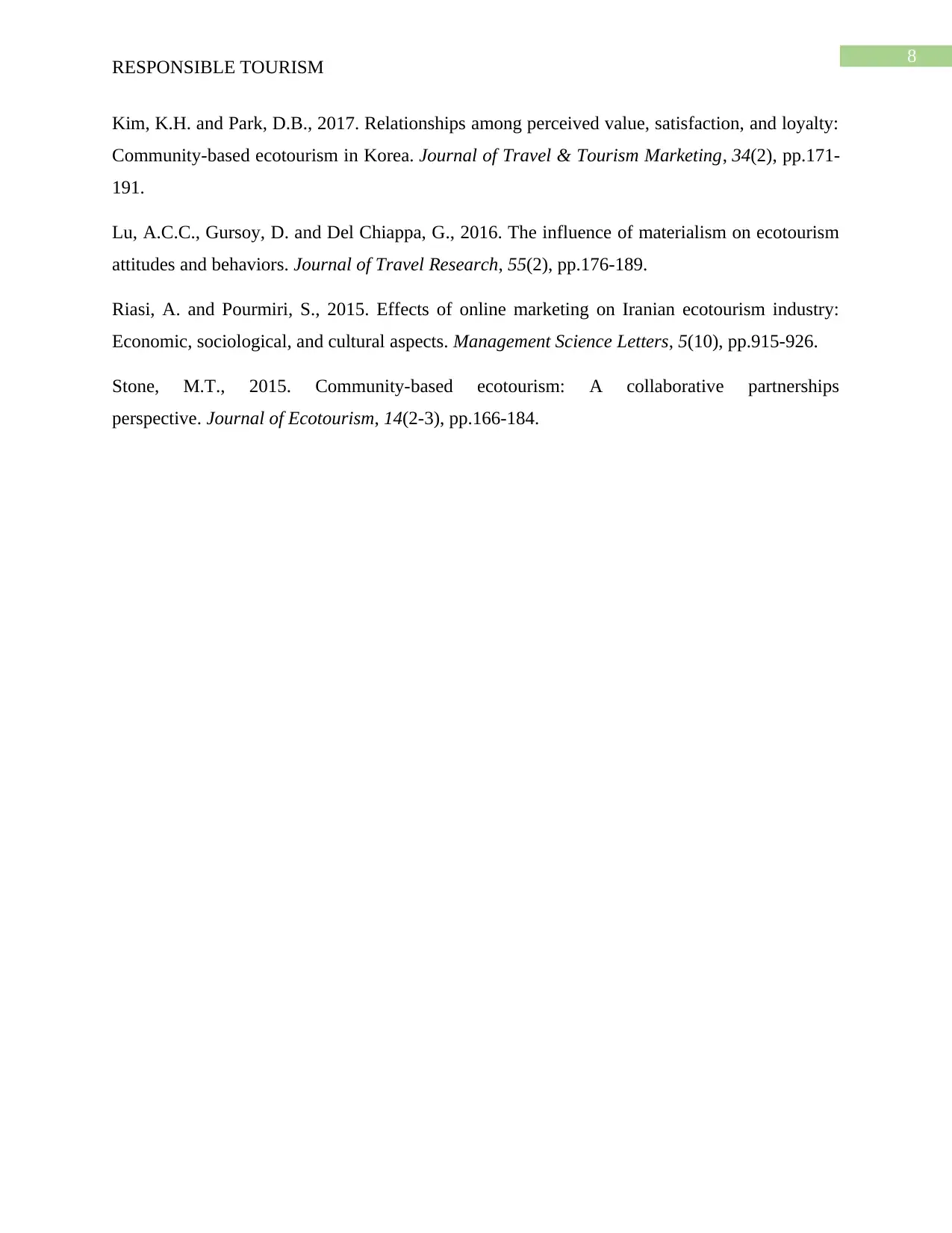
8
RESPONSIBLE TOURISM
Kim, K.H. and Park, D.B., 2017. Relationships among perceived value, satisfaction, and loyalty:
Community-based ecotourism in Korea. Journal of Travel & Tourism Marketing, 34(2), pp.171-
191.
Lu, A.C.C., Gursoy, D. and Del Chiappa, G., 2016. The influence of materialism on ecotourism
attitudes and behaviors. Journal of Travel Research, 55(2), pp.176-189.
Riasi, A. and Pourmiri, S., 2015. Effects of online marketing on Iranian ecotourism industry:
Economic, sociological, and cultural aspects. Management Science Letters, 5(10), pp.915-926.
Stone, M.T., 2015. Community-based ecotourism: A collaborative partnerships
perspective. Journal of Ecotourism, 14(2-3), pp.166-184.
RESPONSIBLE TOURISM
Kim, K.H. and Park, D.B., 2017. Relationships among perceived value, satisfaction, and loyalty:
Community-based ecotourism in Korea. Journal of Travel & Tourism Marketing, 34(2), pp.171-
191.
Lu, A.C.C., Gursoy, D. and Del Chiappa, G., 2016. The influence of materialism on ecotourism
attitudes and behaviors. Journal of Travel Research, 55(2), pp.176-189.
Riasi, A. and Pourmiri, S., 2015. Effects of online marketing on Iranian ecotourism industry:
Economic, sociological, and cultural aspects. Management Science Letters, 5(10), pp.915-926.
Stone, M.T., 2015. Community-based ecotourism: A collaborative partnerships
perspective. Journal of Ecotourism, 14(2-3), pp.166-184.
⊘ This is a preview!⊘
Do you want full access?
Subscribe today to unlock all pages.

Trusted by 1+ million students worldwide
1 out of 9
Related Documents
Your All-in-One AI-Powered Toolkit for Academic Success.
+13062052269
info@desklib.com
Available 24*7 on WhatsApp / Email
![[object Object]](/_next/static/media/star-bottom.7253800d.svg)
Unlock your academic potential
Copyright © 2020–2026 A2Z Services. All Rights Reserved. Developed and managed by ZUCOL.





